Impact of Factors on Enhancing Mental Health Service Access
VerifiedAdded on 2022/09/09
|18
|5510
|25
Essay
AI Summary
This essay delves into the critical issue of enhancing access to mental health services, examining various factors that influence the design and delivery of care. It highlights the importance of addressing cultural factors, such as the public's understanding of mental health conditions and the pervasive stigma and discrimination associated with mental illness. The essay also explores social factors, including fragmented care systems and the potential of technological advancements to improve access. Furthermore, it analyzes economic factors, particularly the impact of a lack of trained workforce and its distribution. The paper emphasizes the need for a multifaceted approach that considers these interconnected factors to create effective strategies for improving access to mental health services globally. The essay uses the case study of Nigeria and the challenges faced by it to highlight the importance of providing accessible mental health services.
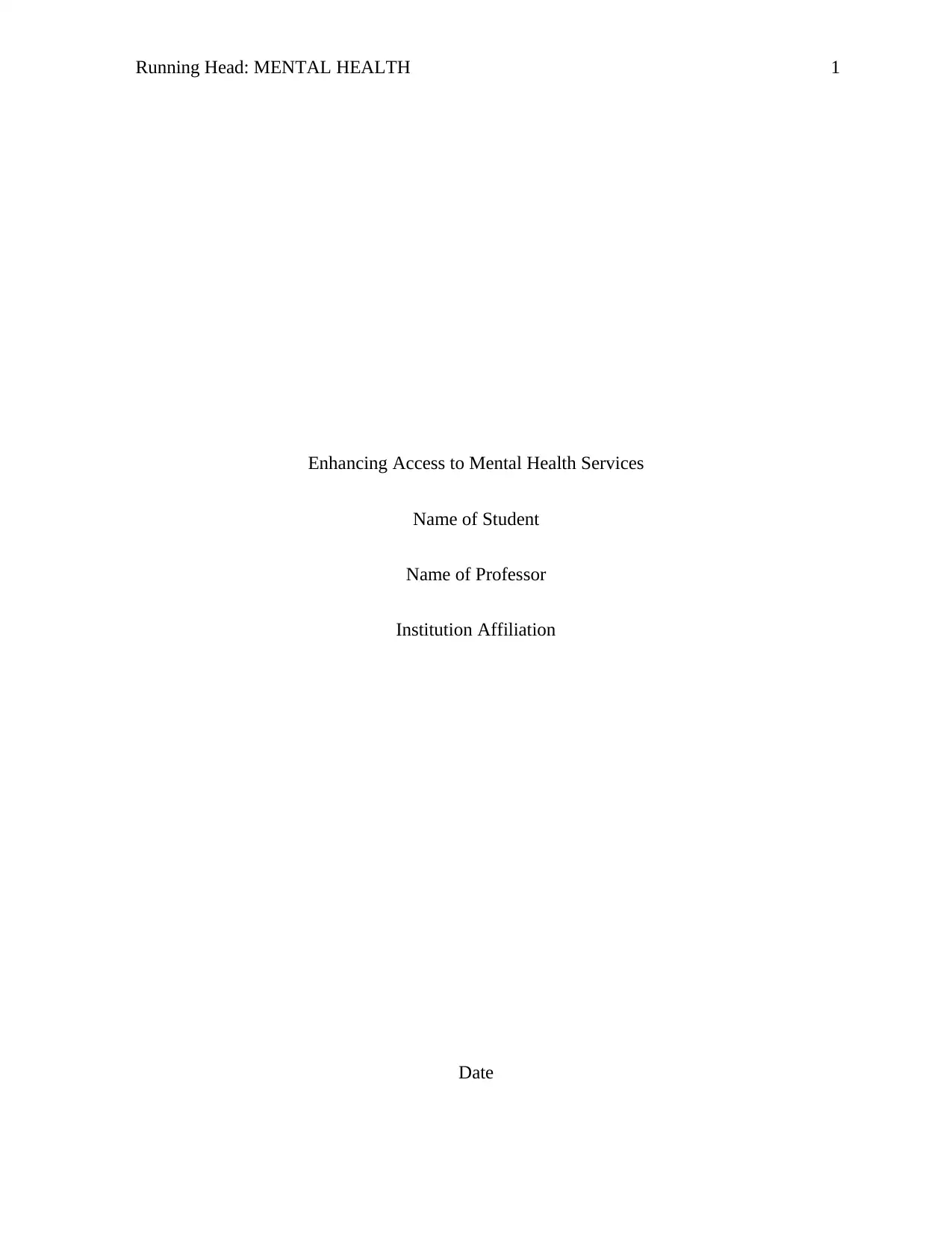
Running Head: MENTAL HEALTH 1
Enhancing Access to Mental Health Services
Name of Student
Name of Professor
Institution Affiliation
Date
Enhancing Access to Mental Health Services
Name of Student
Name of Professor
Institution Affiliation
Date
Paraphrase This Document
Need a fresh take? Get an instant paraphrase of this document with our AI Paraphraser
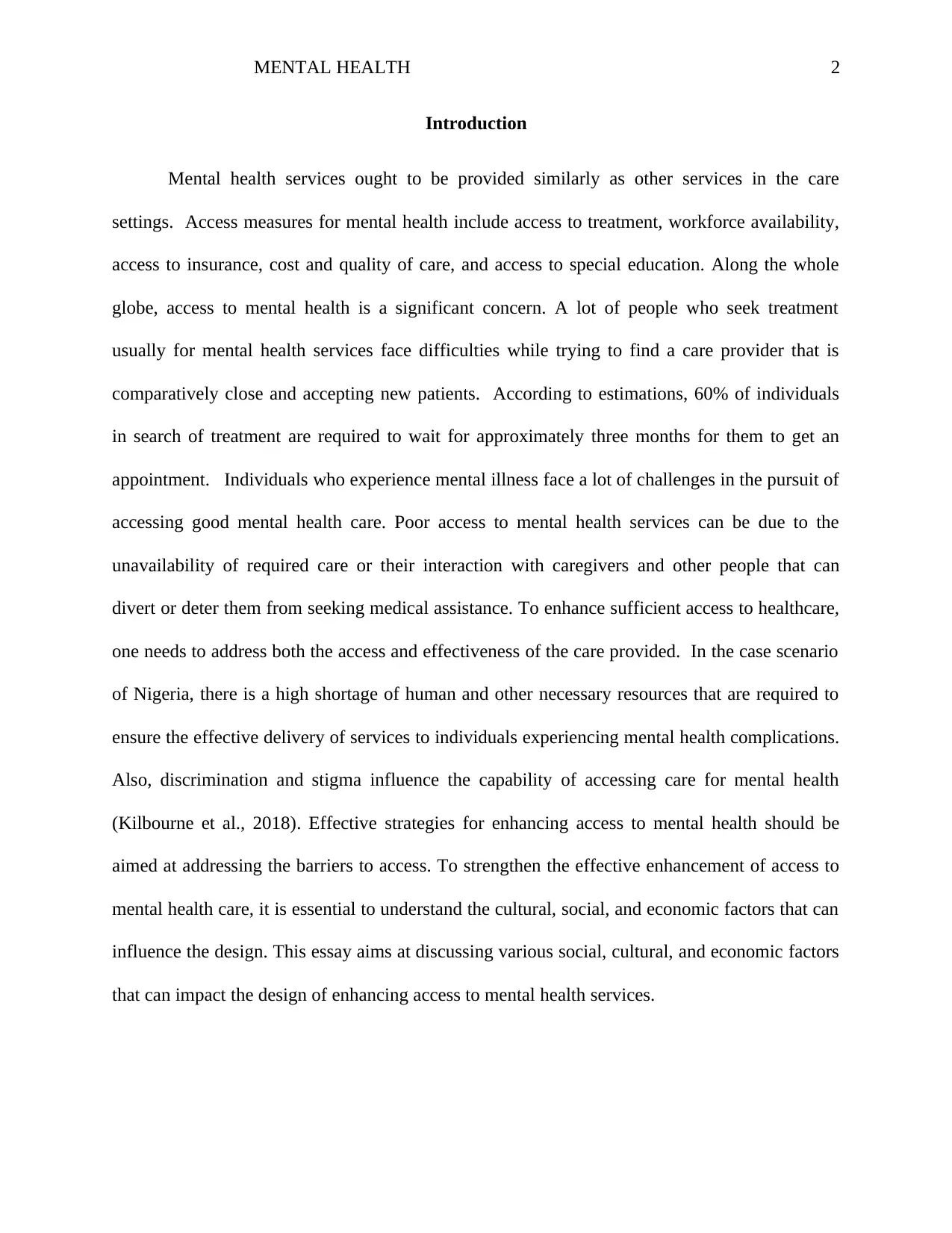
MENTAL HEALTH 2
Introduction
Mental health services ought to be provided similarly as other services in the care
settings. Access measures for mental health include access to treatment, workforce availability,
access to insurance, cost and quality of care, and access to special education. Along the whole
globe, access to mental health is a significant concern. A lot of people who seek treatment
usually for mental health services face difficulties while trying to find a care provider that is
comparatively close and accepting new patients. According to estimations, 60% of individuals
in search of treatment are required to wait for approximately three months for them to get an
appointment. Individuals who experience mental illness face a lot of challenges in the pursuit of
accessing good mental health care. Poor access to mental health services can be due to the
unavailability of required care or their interaction with caregivers and other people that can
divert or deter them from seeking medical assistance. To enhance sufficient access to healthcare,
one needs to address both the access and effectiveness of the care provided. In the case scenario
of Nigeria, there is a high shortage of human and other necessary resources that are required to
ensure the effective delivery of services to individuals experiencing mental health complications.
Also, discrimination and stigma influence the capability of accessing care for mental health
(Kilbourne et al., 2018). Effective strategies for enhancing access to mental health should be
aimed at addressing the barriers to access. To strengthen the effective enhancement of access to
mental health care, it is essential to understand the cultural, social, and economic factors that can
influence the design. This essay aims at discussing various social, cultural, and economic factors
that can impact the design of enhancing access to mental health services.
Introduction
Mental health services ought to be provided similarly as other services in the care
settings. Access measures for mental health include access to treatment, workforce availability,
access to insurance, cost and quality of care, and access to special education. Along the whole
globe, access to mental health is a significant concern. A lot of people who seek treatment
usually for mental health services face difficulties while trying to find a care provider that is
comparatively close and accepting new patients. According to estimations, 60% of individuals
in search of treatment are required to wait for approximately three months for them to get an
appointment. Individuals who experience mental illness face a lot of challenges in the pursuit of
accessing good mental health care. Poor access to mental health services can be due to the
unavailability of required care or their interaction with caregivers and other people that can
divert or deter them from seeking medical assistance. To enhance sufficient access to healthcare,
one needs to address both the access and effectiveness of the care provided. In the case scenario
of Nigeria, there is a high shortage of human and other necessary resources that are required to
ensure the effective delivery of services to individuals experiencing mental health complications.
Also, discrimination and stigma influence the capability of accessing care for mental health
(Kilbourne et al., 2018). Effective strategies for enhancing access to mental health should be
aimed at addressing the barriers to access. To strengthen the effective enhancement of access to
mental health care, it is essential to understand the cultural, social, and economic factors that can
influence the design. This essay aims at discussing various social, cultural, and economic factors
that can impact the design of enhancing access to mental health services.
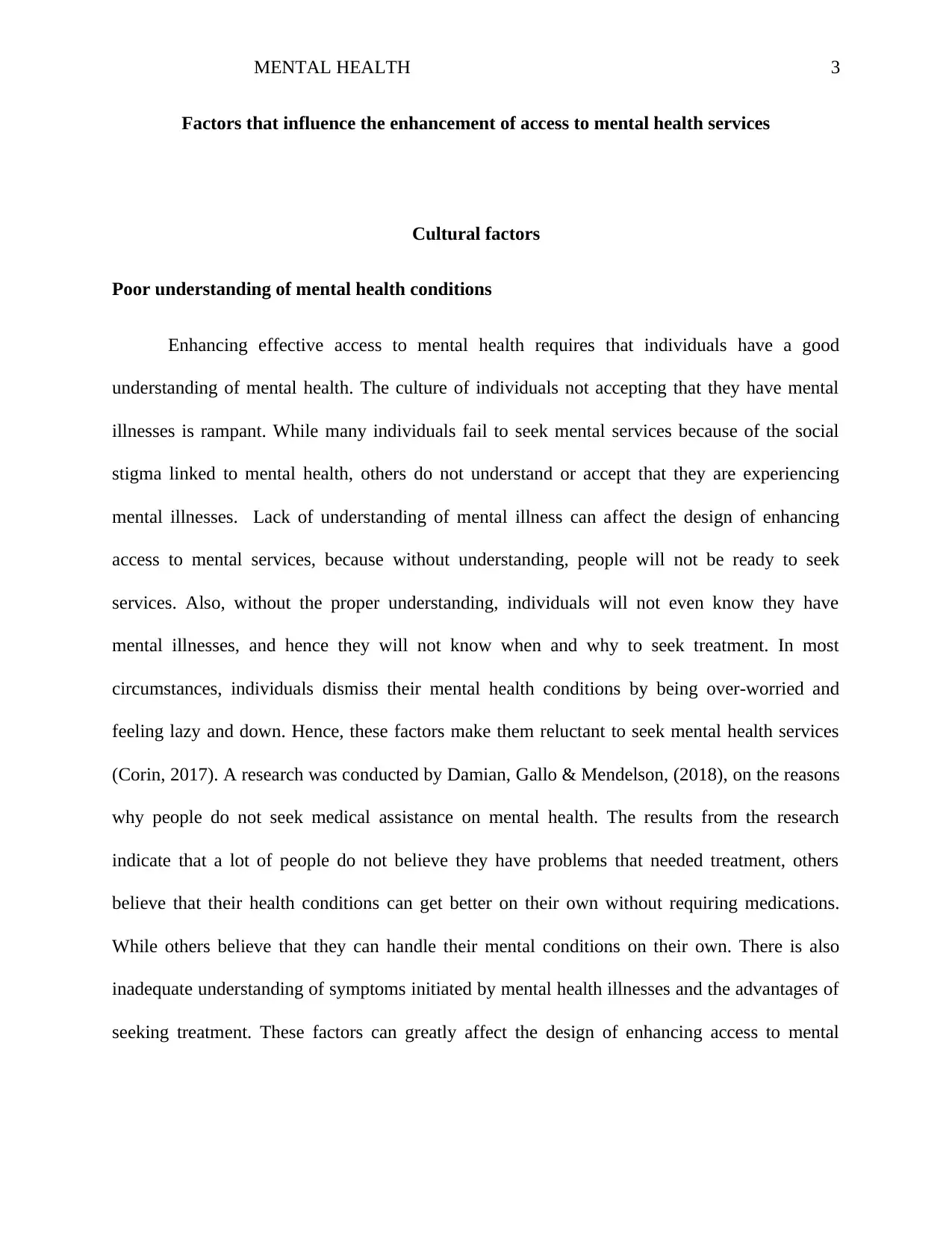
MENTAL HEALTH 3
Factors that influence the enhancement of access to mental health services
Cultural factors
Poor understanding of mental health conditions
Enhancing effective access to mental health requires that individuals have a good
understanding of mental health. The culture of individuals not accepting that they have mental
illnesses is rampant. While many individuals fail to seek mental services because of the social
stigma linked to mental health, others do not understand or accept that they are experiencing
mental illnesses. Lack of understanding of mental illness can affect the design of enhancing
access to mental services, because without understanding, people will not be ready to seek
services. Also, without the proper understanding, individuals will not even know they have
mental illnesses, and hence they will not know when and why to seek treatment. In most
circumstances, individuals dismiss their mental health conditions by being over-worried and
feeling lazy and down. Hence, these factors make them reluctant to seek mental health services
(Corin, 2017). A research was conducted by Damian, Gallo & Mendelson, (2018), on the reasons
why people do not seek medical assistance on mental health. The results from the research
indicate that a lot of people do not believe they have problems that needed treatment, others
believe that their health conditions can get better on their own without requiring medications.
While others believe that they can handle their mental conditions on their own. There is also
inadequate understanding of symptoms initiated by mental health illnesses and the advantages of
seeking treatment. These factors can greatly affect the design of enhancing access to mental
Factors that influence the enhancement of access to mental health services
Cultural factors
Poor understanding of mental health conditions
Enhancing effective access to mental health requires that individuals have a good
understanding of mental health. The culture of individuals not accepting that they have mental
illnesses is rampant. While many individuals fail to seek mental services because of the social
stigma linked to mental health, others do not understand or accept that they are experiencing
mental illnesses. Lack of understanding of mental illness can affect the design of enhancing
access to mental services, because without understanding, people will not be ready to seek
services. Also, without the proper understanding, individuals will not even know they have
mental illnesses, and hence they will not know when and why to seek treatment. In most
circumstances, individuals dismiss their mental health conditions by being over-worried and
feeling lazy and down. Hence, these factors make them reluctant to seek mental health services
(Corin, 2017). A research was conducted by Damian, Gallo & Mendelson, (2018), on the reasons
why people do not seek medical assistance on mental health. The results from the research
indicate that a lot of people do not believe they have problems that needed treatment, others
believe that their health conditions can get better on their own without requiring medications.
While others believe that they can handle their mental conditions on their own. There is also
inadequate understanding of symptoms initiated by mental health illnesses and the advantages of
seeking treatment. These factors can greatly affect the design of enhancing access to mental
⊘ This is a preview!⊘
Do you want full access?
Subscribe today to unlock all pages.

Trusted by 1+ million students worldwide
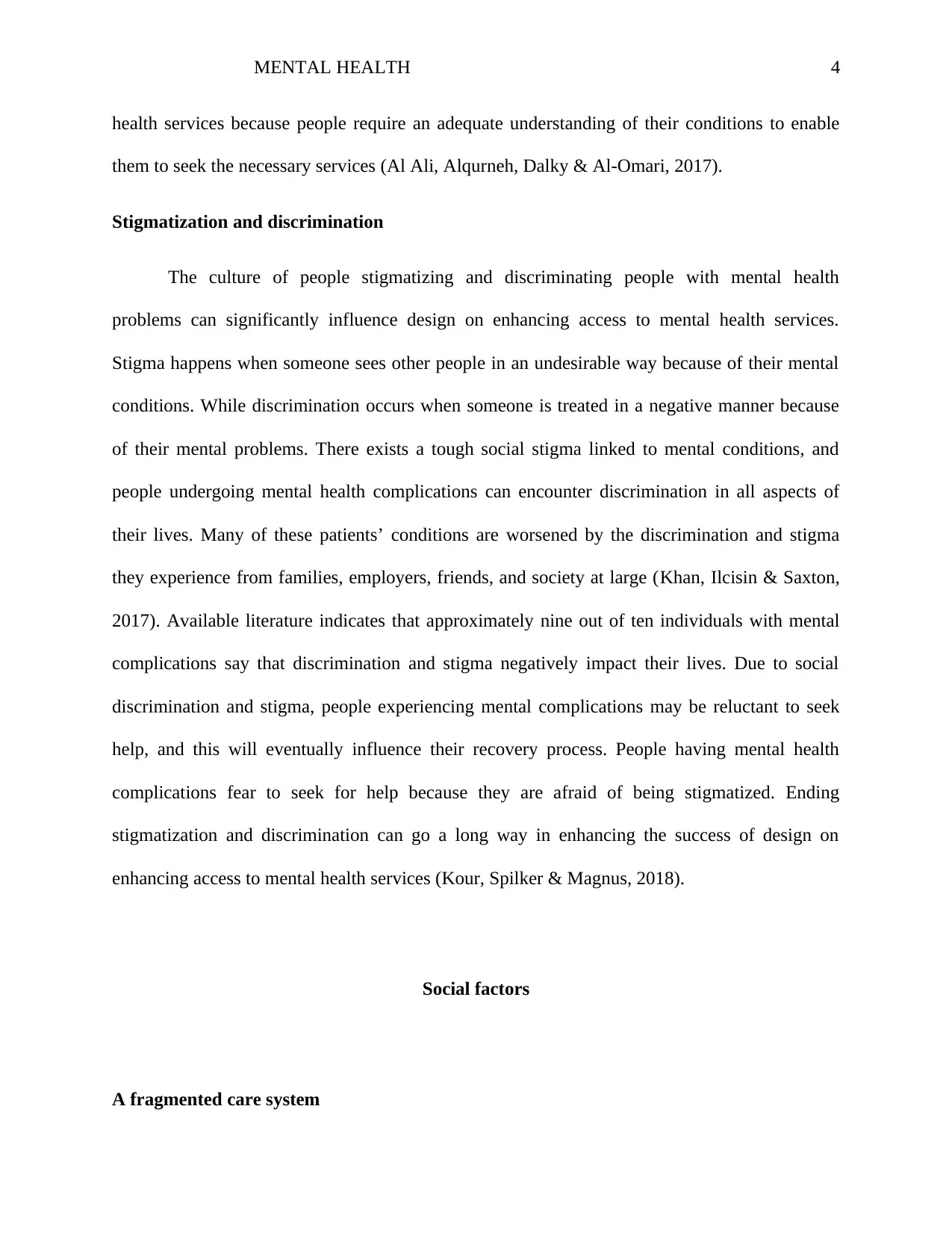
MENTAL HEALTH 4
health services because people require an adequate understanding of their conditions to enable
them to seek the necessary services (Al Ali, Alqurneh, Dalky & Al-Omari, 2017).
Stigmatization and discrimination
The culture of people stigmatizing and discriminating people with mental health
problems can significantly influence design on enhancing access to mental health services.
Stigma happens when someone sees other people in an undesirable way because of their mental
conditions. While discrimination occurs when someone is treated in a negative manner because
of their mental problems. There exists a tough social stigma linked to mental conditions, and
people undergoing mental health complications can encounter discrimination in all aspects of
their lives. Many of these patients’ conditions are worsened by the discrimination and stigma
they experience from families, employers, friends, and society at large (Khan, Ilcisin & Saxton,
2017). Available literature indicates that approximately nine out of ten individuals with mental
complications say that discrimination and stigma negatively impact their lives. Due to social
discrimination and stigma, people experiencing mental complications may be reluctant to seek
help, and this will eventually influence their recovery process. People having mental health
complications fear to seek for help because they are afraid of being stigmatized. Ending
stigmatization and discrimination can go a long way in enhancing the success of design on
enhancing access to mental health services (Kour, Spilker & Magnus, 2018).
Social factors
A fragmented care system
health services because people require an adequate understanding of their conditions to enable
them to seek the necessary services (Al Ali, Alqurneh, Dalky & Al-Omari, 2017).
Stigmatization and discrimination
The culture of people stigmatizing and discriminating people with mental health
problems can significantly influence design on enhancing access to mental health services.
Stigma happens when someone sees other people in an undesirable way because of their mental
conditions. While discrimination occurs when someone is treated in a negative manner because
of their mental problems. There exists a tough social stigma linked to mental conditions, and
people undergoing mental health complications can encounter discrimination in all aspects of
their lives. Many of these patients’ conditions are worsened by the discrimination and stigma
they experience from families, employers, friends, and society at large (Khan, Ilcisin & Saxton,
2017). Available literature indicates that approximately nine out of ten individuals with mental
complications say that discrimination and stigma negatively impact their lives. Due to social
discrimination and stigma, people experiencing mental complications may be reluctant to seek
help, and this will eventually influence their recovery process. People having mental health
complications fear to seek for help because they are afraid of being stigmatized. Ending
stigmatization and discrimination can go a long way in enhancing the success of design on
enhancing access to mental health services (Kour, Spilker & Magnus, 2018).
Social factors
A fragmented care system
Paraphrase This Document
Need a fresh take? Get an instant paraphrase of this document with our AI Paraphraser
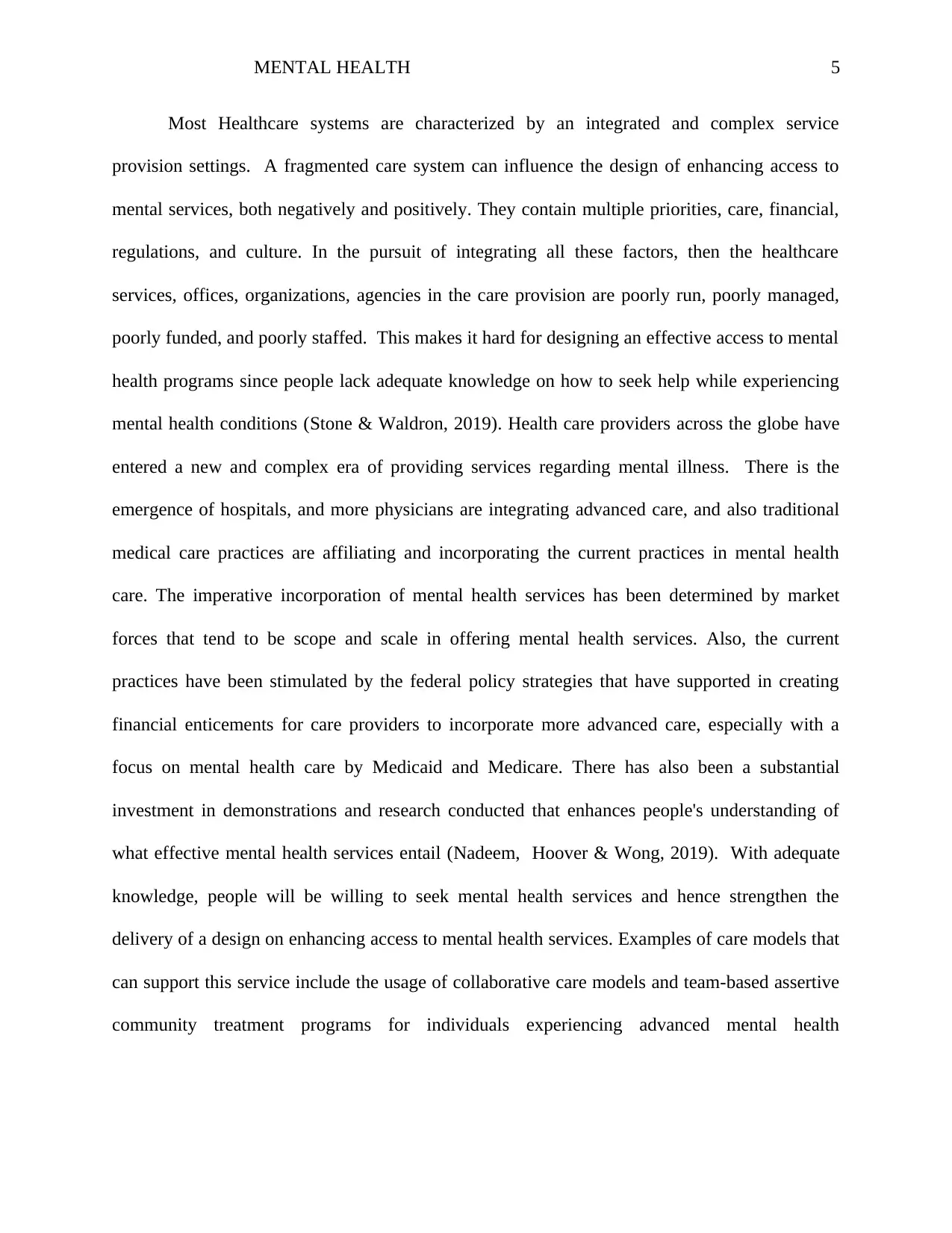
MENTAL HEALTH 5
Most Healthcare systems are characterized by an integrated and complex service
provision settings. A fragmented care system can influence the design of enhancing access to
mental services, both negatively and positively. They contain multiple priorities, care, financial,
regulations, and culture. In the pursuit of integrating all these factors, then the healthcare
services, offices, organizations, agencies in the care provision are poorly run, poorly managed,
poorly funded, and poorly staffed. This makes it hard for designing an effective access to mental
health programs since people lack adequate knowledge on how to seek help while experiencing
mental health conditions (Stone & Waldron, 2019). Health care providers across the globe have
entered a new and complex era of providing services regarding mental illness. There is the
emergence of hospitals, and more physicians are integrating advanced care, and also traditional
medical care practices are affiliating and incorporating the current practices in mental health
care. The imperative incorporation of mental health services has been determined by market
forces that tend to be scope and scale in offering mental health services. Also, the current
practices have been stimulated by the federal policy strategies that have supported in creating
financial enticements for care providers to incorporate more advanced care, especially with a
focus on mental health care by Medicaid and Medicare. There has also been a substantial
investment in demonstrations and research conducted that enhances people's understanding of
what effective mental health services entail (Nadeem, Hoover & Wong, 2019). With adequate
knowledge, people will be willing to seek mental health services and hence strengthen the
delivery of a design on enhancing access to mental health services. Examples of care models that
can support this service include the usage of collaborative care models and team-based assertive
community treatment programs for individuals experiencing advanced mental health
Most Healthcare systems are characterized by an integrated and complex service
provision settings. A fragmented care system can influence the design of enhancing access to
mental services, both negatively and positively. They contain multiple priorities, care, financial,
regulations, and culture. In the pursuit of integrating all these factors, then the healthcare
services, offices, organizations, agencies in the care provision are poorly run, poorly managed,
poorly funded, and poorly staffed. This makes it hard for designing an effective access to mental
health programs since people lack adequate knowledge on how to seek help while experiencing
mental health conditions (Stone & Waldron, 2019). Health care providers across the globe have
entered a new and complex era of providing services regarding mental illness. There is the
emergence of hospitals, and more physicians are integrating advanced care, and also traditional
medical care practices are affiliating and incorporating the current practices in mental health
care. The imperative incorporation of mental health services has been determined by market
forces that tend to be scope and scale in offering mental health services. Also, the current
practices have been stimulated by the federal policy strategies that have supported in creating
financial enticements for care providers to incorporate more advanced care, especially with a
focus on mental health care by Medicaid and Medicare. There has also been a substantial
investment in demonstrations and research conducted that enhances people's understanding of
what effective mental health services entail (Nadeem, Hoover & Wong, 2019). With adequate
knowledge, people will be willing to seek mental health services and hence strengthen the
delivery of a design on enhancing access to mental health services. Examples of care models that
can support this service include the usage of collaborative care models and team-based assertive
community treatment programs for individuals experiencing advanced mental health
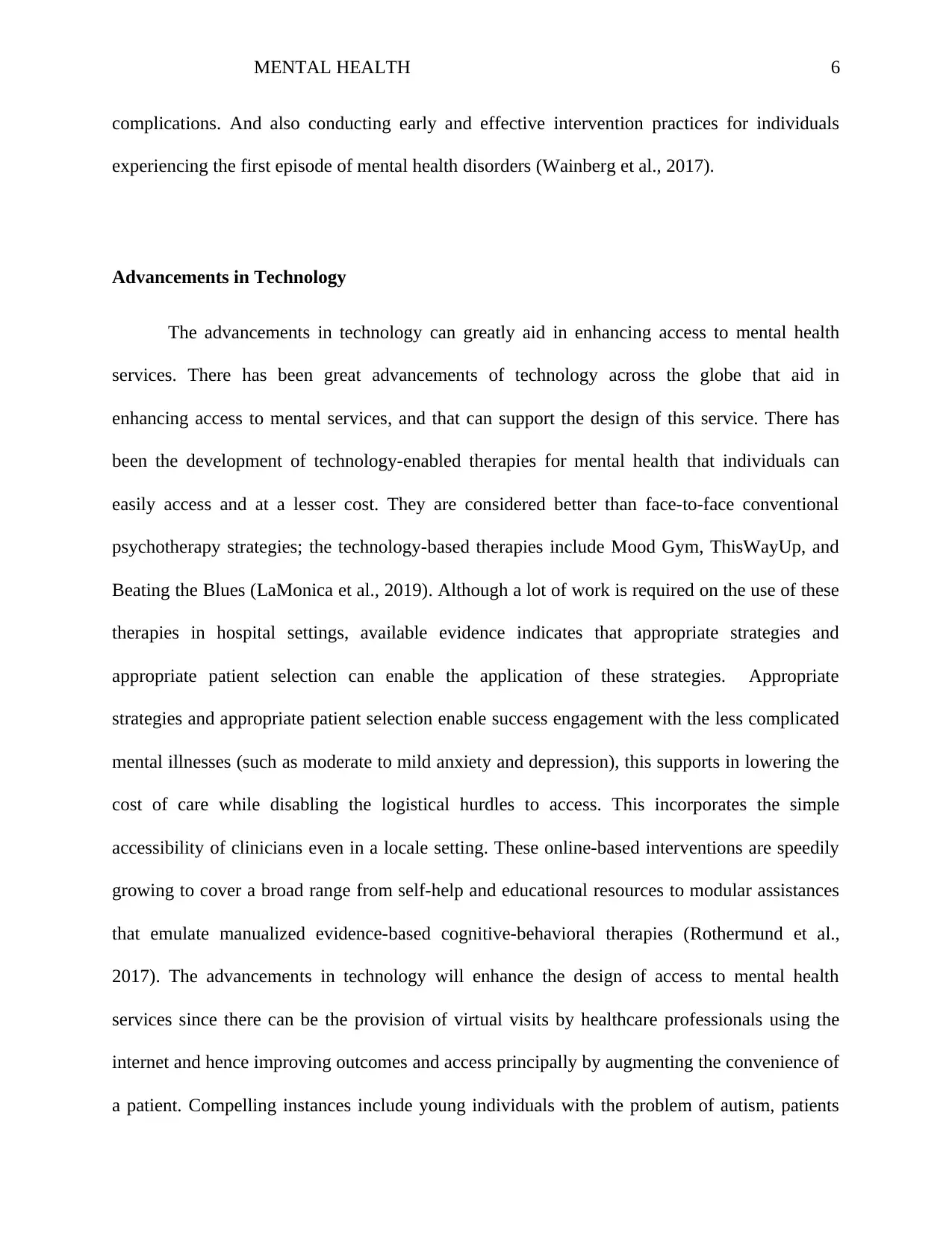
MENTAL HEALTH 6
complications. And also conducting early and effective intervention practices for individuals
experiencing the first episode of mental health disorders (Wainberg et al., 2017).
Advancements in Technology
The advancements in technology can greatly aid in enhancing access to mental health
services. There has been great advancements of technology across the globe that aid in
enhancing access to mental services, and that can support the design of this service. There has
been the development of technology-enabled therapies for mental health that individuals can
easily access and at a lesser cost. They are considered better than face-to-face conventional
psychotherapy strategies; the technology-based therapies include Mood Gym, ThisWayUp, and
Beating the Blues (LaMonica et al., 2019). Although a lot of work is required on the use of these
therapies in hospital settings, available evidence indicates that appropriate strategies and
appropriate patient selection can enable the application of these strategies. Appropriate
strategies and appropriate patient selection enable success engagement with the less complicated
mental illnesses (such as moderate to mild anxiety and depression), this supports in lowering the
cost of care while disabling the logistical hurdles to access. This incorporates the simple
accessibility of clinicians even in a locale setting. These online-based interventions are speedily
growing to cover a broad range from self-help and educational resources to modular assistances
that emulate manualized evidence-based cognitive-behavioral therapies (Rothermund et al.,
2017). The advancements in technology will enhance the design of access to mental health
services since there can be the provision of virtual visits by healthcare professionals using the
internet and hence improving outcomes and access principally by augmenting the convenience of
a patient. Compelling instances include young individuals with the problem of autism, patients
complications. And also conducting early and effective intervention practices for individuals
experiencing the first episode of mental health disorders (Wainberg et al., 2017).
Advancements in Technology
The advancements in technology can greatly aid in enhancing access to mental health
services. There has been great advancements of technology across the globe that aid in
enhancing access to mental services, and that can support the design of this service. There has
been the development of technology-enabled therapies for mental health that individuals can
easily access and at a lesser cost. They are considered better than face-to-face conventional
psychotherapy strategies; the technology-based therapies include Mood Gym, ThisWayUp, and
Beating the Blues (LaMonica et al., 2019). Although a lot of work is required on the use of these
therapies in hospital settings, available evidence indicates that appropriate strategies and
appropriate patient selection can enable the application of these strategies. Appropriate
strategies and appropriate patient selection enable success engagement with the less complicated
mental illnesses (such as moderate to mild anxiety and depression), this supports in lowering the
cost of care while disabling the logistical hurdles to access. This incorporates the simple
accessibility of clinicians even in a locale setting. These online-based interventions are speedily
growing to cover a broad range from self-help and educational resources to modular assistances
that emulate manualized evidence-based cognitive-behavioral therapies (Rothermund et al.,
2017). The advancements in technology will enhance the design of access to mental health
services since there can be the provision of virtual visits by healthcare professionals using the
internet and hence improving outcomes and access principally by augmenting the convenience of
a patient. Compelling instances include young individuals with the problem of autism, patients
⊘ This is a preview!⊘
Do you want full access?
Subscribe today to unlock all pages.

Trusted by 1+ million students worldwide
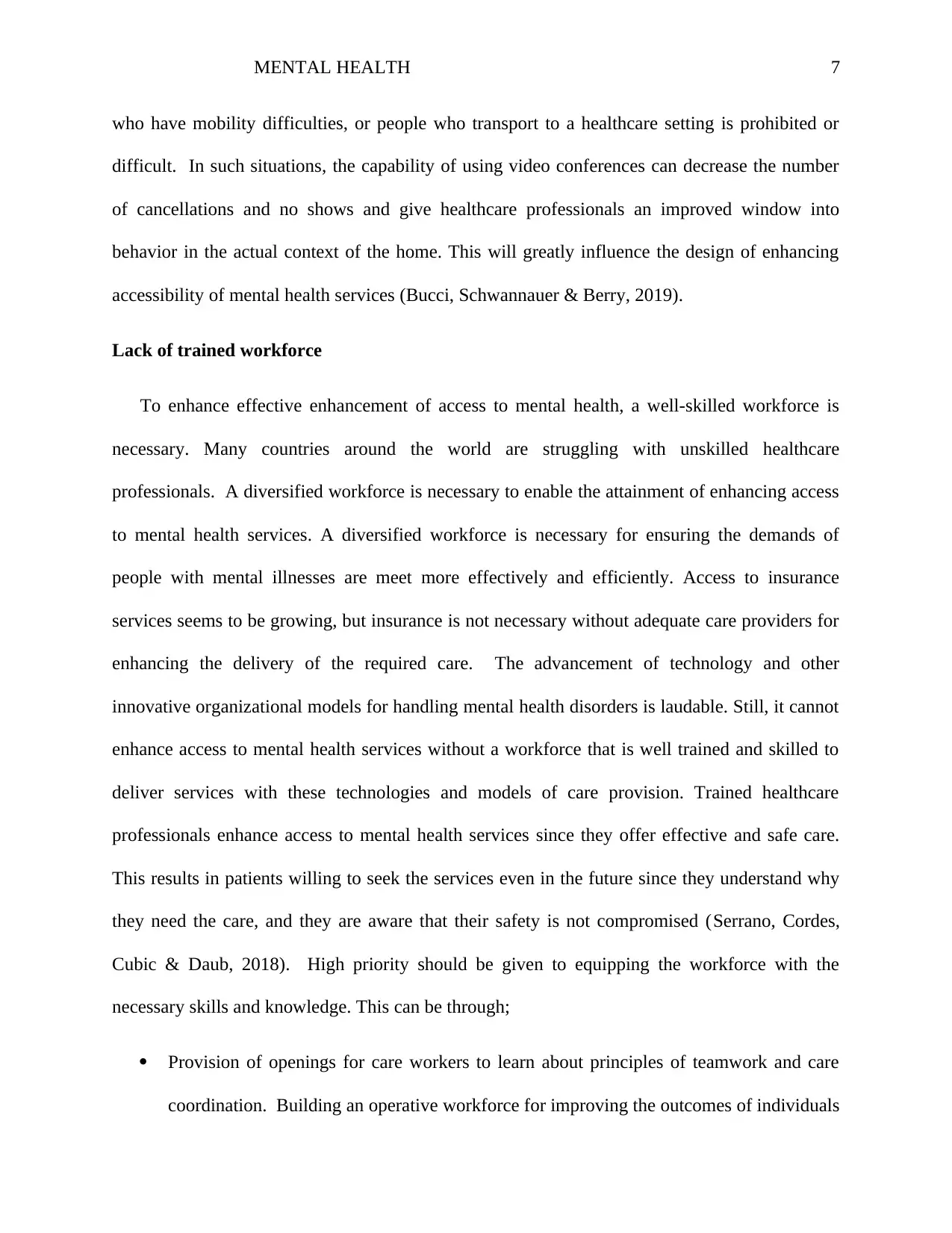
MENTAL HEALTH 7
who have mobility difficulties, or people who transport to a healthcare setting is prohibited or
difficult. In such situations, the capability of using video conferences can decrease the number
of cancellations and no shows and give healthcare professionals an improved window into
behavior in the actual context of the home. This will greatly influence the design of enhancing
accessibility of mental health services (Bucci, Schwannauer & Berry, 2019).
Lack of trained workforce
To enhance effective enhancement of access to mental health, a well-skilled workforce is
necessary. Many countries around the world are struggling with unskilled healthcare
professionals. A diversified workforce is necessary to enable the attainment of enhancing access
to mental health services. A diversified workforce is necessary for ensuring the demands of
people with mental illnesses are meet more effectively and efficiently. Access to insurance
services seems to be growing, but insurance is not necessary without adequate care providers for
enhancing the delivery of the required care. The advancement of technology and other
innovative organizational models for handling mental health disorders is laudable. Still, it cannot
enhance access to mental health services without a workforce that is well trained and skilled to
deliver services with these technologies and models of care provision. Trained healthcare
professionals enhance access to mental health services since they offer effective and safe care.
This results in patients willing to seek the services even in the future since they understand why
they need the care, and they are aware that their safety is not compromised (Serrano, Cordes,
Cubic & Daub, 2018). High priority should be given to equipping the workforce with the
necessary skills and knowledge. This can be through;
Provision of openings for care workers to learn about principles of teamwork and care
coordination. Building an operative workforce for improving the outcomes of individuals
who have mobility difficulties, or people who transport to a healthcare setting is prohibited or
difficult. In such situations, the capability of using video conferences can decrease the number
of cancellations and no shows and give healthcare professionals an improved window into
behavior in the actual context of the home. This will greatly influence the design of enhancing
accessibility of mental health services (Bucci, Schwannauer & Berry, 2019).
Lack of trained workforce
To enhance effective enhancement of access to mental health, a well-skilled workforce is
necessary. Many countries around the world are struggling with unskilled healthcare
professionals. A diversified workforce is necessary to enable the attainment of enhancing access
to mental health services. A diversified workforce is necessary for ensuring the demands of
people with mental illnesses are meet more effectively and efficiently. Access to insurance
services seems to be growing, but insurance is not necessary without adequate care providers for
enhancing the delivery of the required care. The advancement of technology and other
innovative organizational models for handling mental health disorders is laudable. Still, it cannot
enhance access to mental health services without a workforce that is well trained and skilled to
deliver services with these technologies and models of care provision. Trained healthcare
professionals enhance access to mental health services since they offer effective and safe care.
This results in patients willing to seek the services even in the future since they understand why
they need the care, and they are aware that their safety is not compromised (Serrano, Cordes,
Cubic & Daub, 2018). High priority should be given to equipping the workforce with the
necessary skills and knowledge. This can be through;
Provision of openings for care workers to learn about principles of teamwork and care
coordination. Building an operative workforce for improving the outcomes of individuals
Paraphrase This Document
Need a fresh take? Get an instant paraphrase of this document with our AI Paraphraser
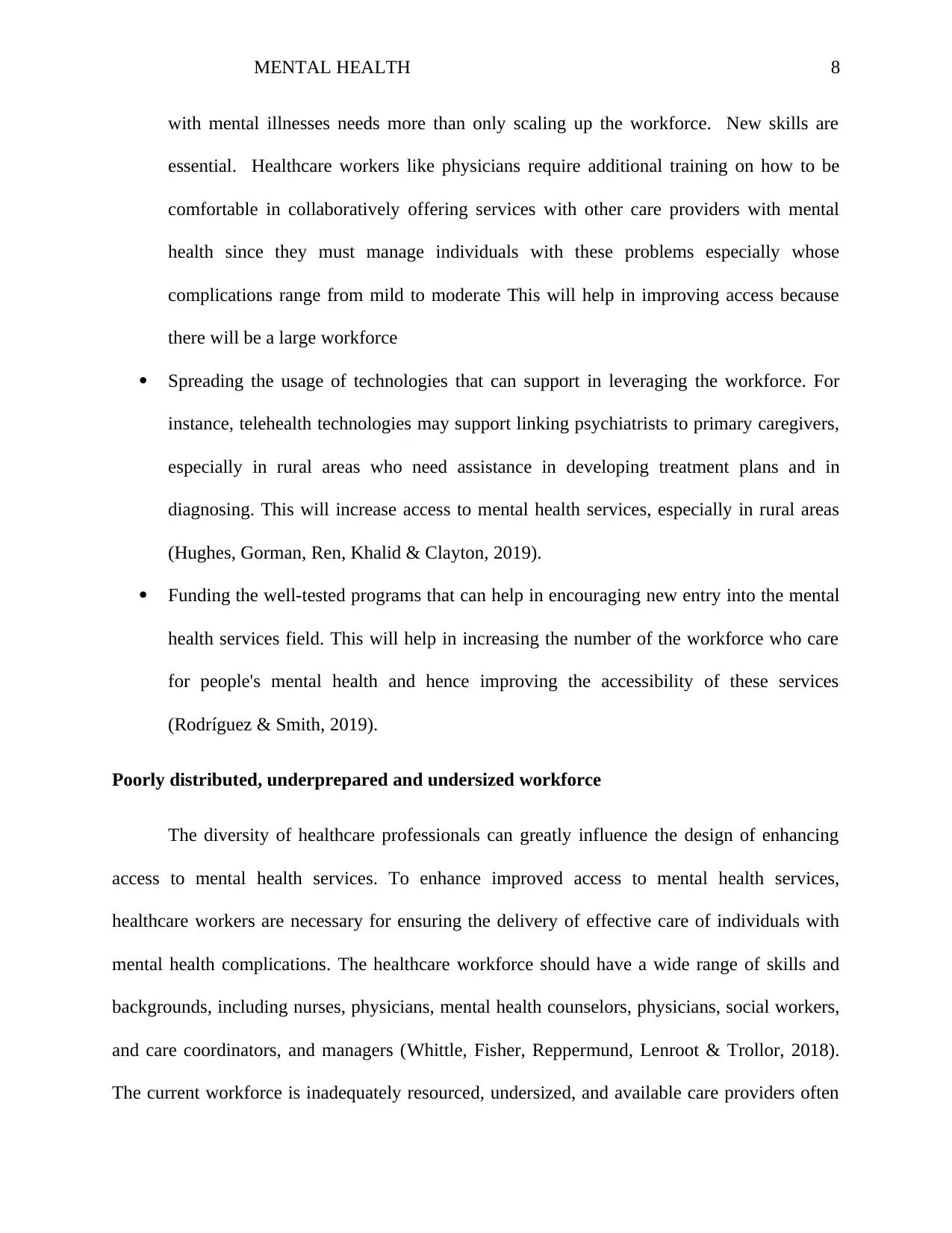
MENTAL HEALTH 8
with mental illnesses needs more than only scaling up the workforce. New skills are
essential. Healthcare workers like physicians require additional training on how to be
comfortable in collaboratively offering services with other care providers with mental
health since they must manage individuals with these problems especially whose
complications range from mild to moderate This will help in improving access because
there will be a large workforce
Spreading the usage of technologies that can support in leveraging the workforce. For
instance, telehealth technologies may support linking psychiatrists to primary caregivers,
especially in rural areas who need assistance in developing treatment plans and in
diagnosing. This will increase access to mental health services, especially in rural areas
(Hughes, Gorman, Ren, Khalid & Clayton, 2019).
Funding the well-tested programs that can help in encouraging new entry into the mental
health services field. This will help in increasing the number of the workforce who care
for people's mental health and hence improving the accessibility of these services
(Rodríguez & Smith, 2019).
Poorly distributed, underprepared and undersized workforce
The diversity of healthcare professionals can greatly influence the design of enhancing
access to mental health services. To enhance improved access to mental health services,
healthcare workers are necessary for ensuring the delivery of effective care of individuals with
mental health complications. The healthcare workforce should have a wide range of skills and
backgrounds, including nurses, physicians, mental health counselors, physicians, social workers,
and care coordinators, and managers (Whittle, Fisher, Reppermund, Lenroot & Trollor, 2018).
The current workforce is inadequately resourced, undersized, and available care providers often
with mental illnesses needs more than only scaling up the workforce. New skills are
essential. Healthcare workers like physicians require additional training on how to be
comfortable in collaboratively offering services with other care providers with mental
health since they must manage individuals with these problems especially whose
complications range from mild to moderate This will help in improving access because
there will be a large workforce
Spreading the usage of technologies that can support in leveraging the workforce. For
instance, telehealth technologies may support linking psychiatrists to primary caregivers,
especially in rural areas who need assistance in developing treatment plans and in
diagnosing. This will increase access to mental health services, especially in rural areas
(Hughes, Gorman, Ren, Khalid & Clayton, 2019).
Funding the well-tested programs that can help in encouraging new entry into the mental
health services field. This will help in increasing the number of the workforce who care
for people's mental health and hence improving the accessibility of these services
(Rodríguez & Smith, 2019).
Poorly distributed, underprepared and undersized workforce
The diversity of healthcare professionals can greatly influence the design of enhancing
access to mental health services. To enhance improved access to mental health services,
healthcare workers are necessary for ensuring the delivery of effective care of individuals with
mental health complications. The healthcare workforce should have a wide range of skills and
backgrounds, including nurses, physicians, mental health counselors, physicians, social workers,
and care coordinators, and managers (Whittle, Fisher, Reppermund, Lenroot & Trollor, 2018).
The current workforce is inadequately resourced, undersized, and available care providers often
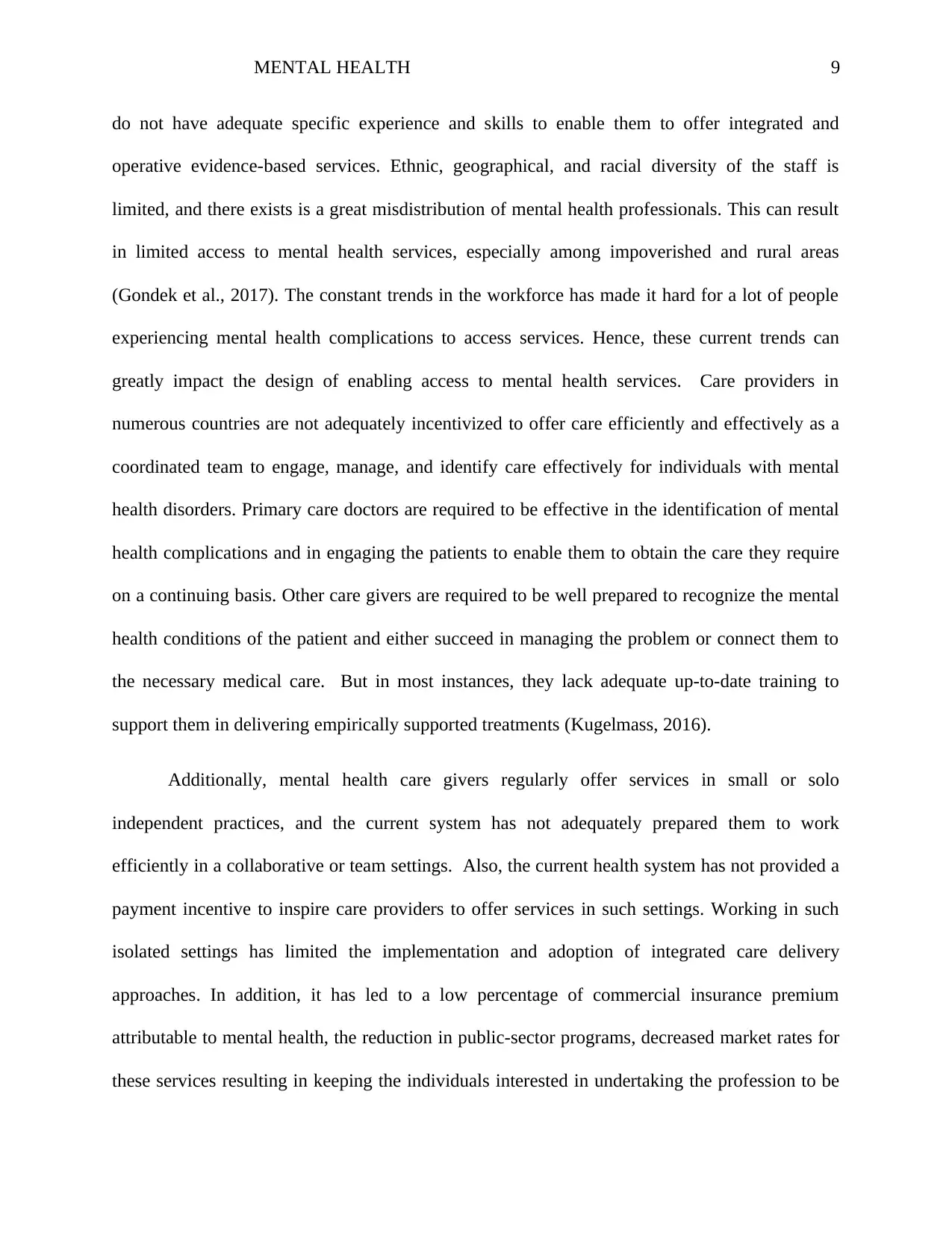
MENTAL HEALTH 9
do not have adequate specific experience and skills to enable them to offer integrated and
operative evidence-based services. Ethnic, geographical, and racial diversity of the staff is
limited, and there exists is a great misdistribution of mental health professionals. This can result
in limited access to mental health services, especially among impoverished and rural areas
(Gondek et al., 2017). The constant trends in the workforce has made it hard for a lot of people
experiencing mental health complications to access services. Hence, these current trends can
greatly impact the design of enabling access to mental health services. Care providers in
numerous countries are not adequately incentivized to offer care efficiently and effectively as a
coordinated team to engage, manage, and identify care effectively for individuals with mental
health disorders. Primary care doctors are required to be effective in the identification of mental
health complications and in engaging the patients to enable them to obtain the care they require
on a continuing basis. Other care givers are required to be well prepared to recognize the mental
health conditions of the patient and either succeed in managing the problem or connect them to
the necessary medical care. But in most instances, they lack adequate up-to-date training to
support them in delivering empirically supported treatments (Kugelmass, 2016).
Additionally, mental health care givers regularly offer services in small or solo
independent practices, and the current system has not adequately prepared them to work
efficiently in a collaborative or team settings. Also, the current health system has not provided a
payment incentive to inspire care providers to offer services in such settings. Working in such
isolated settings has limited the implementation and adoption of integrated care delivery
approaches. In addition, it has led to a low percentage of commercial insurance premium
attributable to mental health, the reduction in public-sector programs, decreased market rates for
these services resulting in keeping the individuals interested in undertaking the profession to be
do not have adequate specific experience and skills to enable them to offer integrated and
operative evidence-based services. Ethnic, geographical, and racial diversity of the staff is
limited, and there exists is a great misdistribution of mental health professionals. This can result
in limited access to mental health services, especially among impoverished and rural areas
(Gondek et al., 2017). The constant trends in the workforce has made it hard for a lot of people
experiencing mental health complications to access services. Hence, these current trends can
greatly impact the design of enabling access to mental health services. Care providers in
numerous countries are not adequately incentivized to offer care efficiently and effectively as a
coordinated team to engage, manage, and identify care effectively for individuals with mental
health disorders. Primary care doctors are required to be effective in the identification of mental
health complications and in engaging the patients to enable them to obtain the care they require
on a continuing basis. Other care givers are required to be well prepared to recognize the mental
health conditions of the patient and either succeed in managing the problem or connect them to
the necessary medical care. But in most instances, they lack adequate up-to-date training to
support them in delivering empirically supported treatments (Kugelmass, 2016).
Additionally, mental health care givers regularly offer services in small or solo
independent practices, and the current system has not adequately prepared them to work
efficiently in a collaborative or team settings. Also, the current health system has not provided a
payment incentive to inspire care providers to offer services in such settings. Working in such
isolated settings has limited the implementation and adoption of integrated care delivery
approaches. In addition, it has led to a low percentage of commercial insurance premium
attributable to mental health, the reduction in public-sector programs, decreased market rates for
these services resulting in keeping the individuals interested in undertaking the profession to be
⊘ This is a preview!⊘
Do you want full access?
Subscribe today to unlock all pages.

Trusted by 1+ million students worldwide
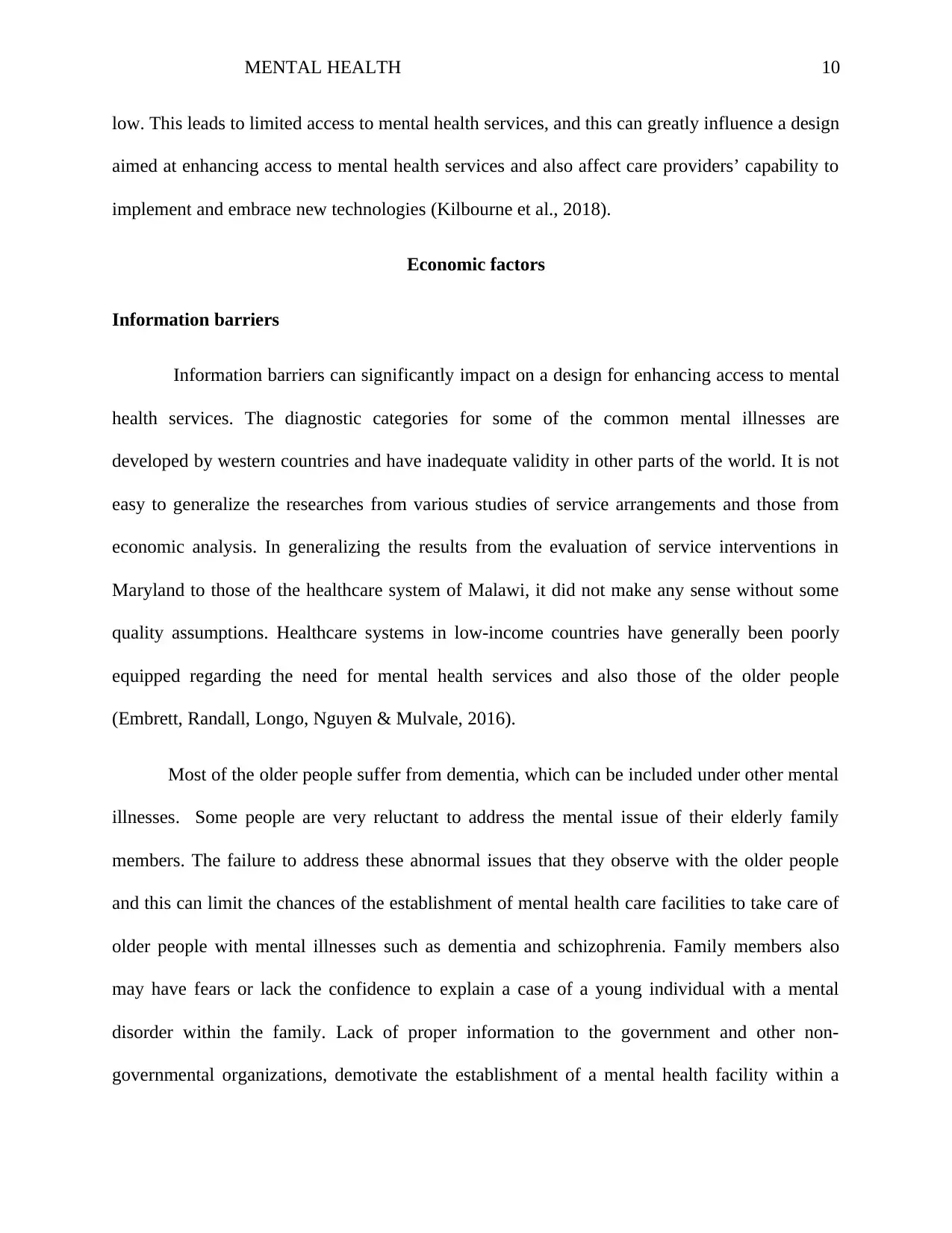
MENTAL HEALTH 10
low. This leads to limited access to mental health services, and this can greatly influence a design
aimed at enhancing access to mental health services and also affect care providers’ capability to
implement and embrace new technologies (Kilbourne et al., 2018).
Economic factors
Information barriers
Information barriers can significantly impact on a design for enhancing access to mental
health services. The diagnostic categories for some of the common mental illnesses are
developed by western countries and have inadequate validity in other parts of the world. It is not
easy to generalize the researches from various studies of service arrangements and those from
economic analysis. In generalizing the results from the evaluation of service interventions in
Maryland to those of the healthcare system of Malawi, it did not make any sense without some
quality assumptions. Healthcare systems in low-income countries have generally been poorly
equipped regarding the need for mental health services and also those of the older people
(Embrett, Randall, Longo, Nguyen & Mulvale, 2016).
Most of the older people suffer from dementia, which can be included under other mental
illnesses. Some people are very reluctant to address the mental issue of their elderly family
members. The failure to address these abnormal issues that they observe with the older people
and this can limit the chances of the establishment of mental health care facilities to take care of
older people with mental illnesses such as dementia and schizophrenia. Family members also
may have fears or lack the confidence to explain a case of a young individual with a mental
disorder within the family. Lack of proper information to the government and other non-
governmental organizations, demotivate the establishment of a mental health facility within a
low. This leads to limited access to mental health services, and this can greatly influence a design
aimed at enhancing access to mental health services and also affect care providers’ capability to
implement and embrace new technologies (Kilbourne et al., 2018).
Economic factors
Information barriers
Information barriers can significantly impact on a design for enhancing access to mental
health services. The diagnostic categories for some of the common mental illnesses are
developed by western countries and have inadequate validity in other parts of the world. It is not
easy to generalize the researches from various studies of service arrangements and those from
economic analysis. In generalizing the results from the evaluation of service interventions in
Maryland to those of the healthcare system of Malawi, it did not make any sense without some
quality assumptions. Healthcare systems in low-income countries have generally been poorly
equipped regarding the need for mental health services and also those of the older people
(Embrett, Randall, Longo, Nguyen & Mulvale, 2016).
Most of the older people suffer from dementia, which can be included under other mental
illnesses. Some people are very reluctant to address the mental issue of their elderly family
members. The failure to address these abnormal issues that they observe with the older people
and this can limit the chances of the establishment of mental health care facilities to take care of
older people with mental illnesses such as dementia and schizophrenia. Family members also
may have fears or lack the confidence to explain a case of a young individual with a mental
disorder within the family. Lack of proper information to the government and other non-
governmental organizations, demotivate the establishment of a mental health facility within a
Paraphrase This Document
Need a fresh take? Get an instant paraphrase of this document with our AI Paraphraser
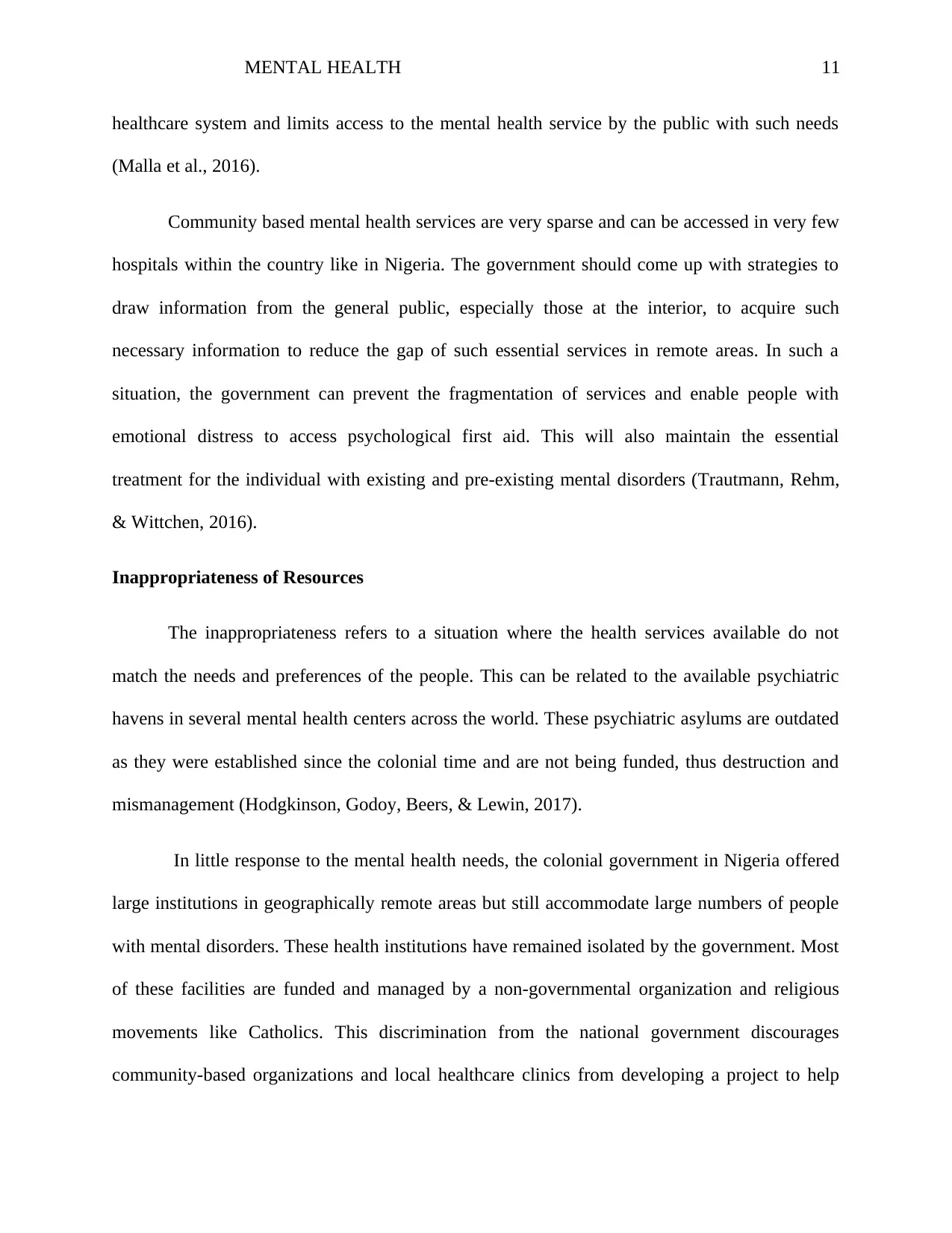
MENTAL HEALTH 11
healthcare system and limits access to the mental health service by the public with such needs
(Malla et al., 2016).
Community based mental health services are very sparse and can be accessed in very few
hospitals within the country like in Nigeria. The government should come up with strategies to
draw information from the general public, especially those at the interior, to acquire such
necessary information to reduce the gap of such essential services in remote areas. In such a
situation, the government can prevent the fragmentation of services and enable people with
emotional distress to access psychological first aid. This will also maintain the essential
treatment for the individual with existing and pre-existing mental disorders (Trautmann, Rehm,
& Wittchen, 2016).
Inappropriateness of Resources
The inappropriateness refers to a situation where the health services available do not
match the needs and preferences of the people. This can be related to the available psychiatric
havens in several mental health centers across the world. These psychiatric asylums are outdated
as they were established since the colonial time and are not being funded, thus destruction and
mismanagement (Hodgkinson, Godoy, Beers, & Lewin, 2017).
In little response to the mental health needs, the colonial government in Nigeria offered
large institutions in geographically remote areas but still accommodate large numbers of people
with mental disorders. These health institutions have remained isolated by the government. Most
of these facilities are funded and managed by a non-governmental organization and religious
movements like Catholics. This discrimination from the national government discourages
community-based organizations and local healthcare clinics from developing a project to help
healthcare system and limits access to the mental health service by the public with such needs
(Malla et al., 2016).
Community based mental health services are very sparse and can be accessed in very few
hospitals within the country like in Nigeria. The government should come up with strategies to
draw information from the general public, especially those at the interior, to acquire such
necessary information to reduce the gap of such essential services in remote areas. In such a
situation, the government can prevent the fragmentation of services and enable people with
emotional distress to access psychological first aid. This will also maintain the essential
treatment for the individual with existing and pre-existing mental disorders (Trautmann, Rehm,
& Wittchen, 2016).
Inappropriateness of Resources
The inappropriateness refers to a situation where the health services available do not
match the needs and preferences of the people. This can be related to the available psychiatric
havens in several mental health centers across the world. These psychiatric asylums are outdated
as they were established since the colonial time and are not being funded, thus destruction and
mismanagement (Hodgkinson, Godoy, Beers, & Lewin, 2017).
In little response to the mental health needs, the colonial government in Nigeria offered
large institutions in geographically remote areas but still accommodate large numbers of people
with mental disorders. These health institutions have remained isolated by the government. Most
of these facilities are funded and managed by a non-governmental organization and religious
movements like Catholics. This discrimination from the national government discourages
community-based organizations and local healthcare clinics from developing a project to help
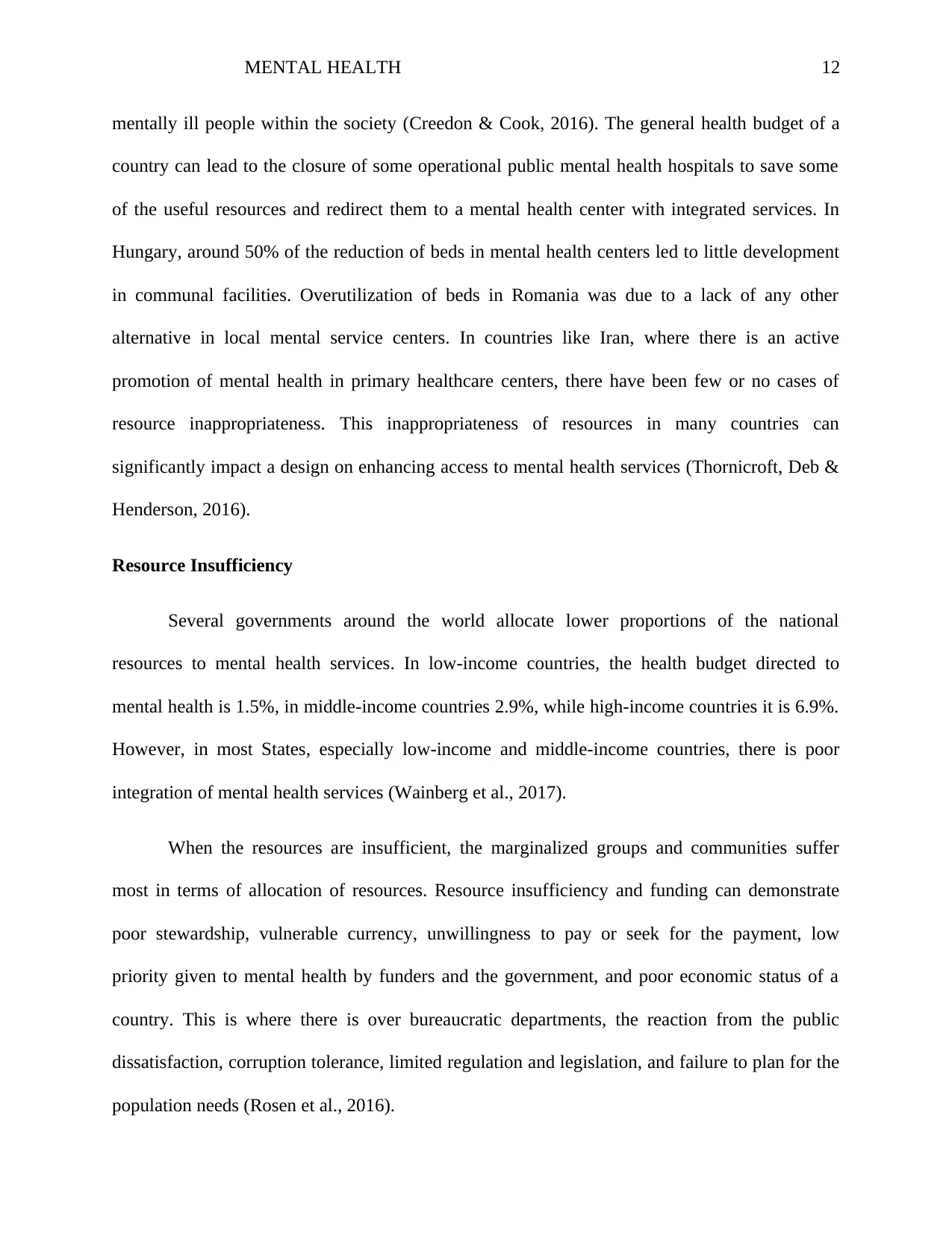
MENTAL HEALTH 12
mentally ill people within the society (Creedon & Cook, 2016). The general health budget of a
country can lead to the closure of some operational public mental health hospitals to save some
of the useful resources and redirect them to a mental health center with integrated services. In
Hungary, around 50% of the reduction of beds in mental health centers led to little development
in communal facilities. Overutilization of beds in Romania was due to a lack of any other
alternative in local mental service centers. In countries like Iran, where there is an active
promotion of mental health in primary healthcare centers, there have been few or no cases of
resource inappropriateness. This inappropriateness of resources in many countries can
significantly impact a design on enhancing access to mental health services (Thornicroft, Deb &
Henderson, 2016).
Resource Insufficiency
Several governments around the world allocate lower proportions of the national
resources to mental health services. In low-income countries, the health budget directed to
mental health is 1.5%, in middle-income countries 2.9%, while high-income countries it is 6.9%.
However, in most States, especially low-income and middle-income countries, there is poor
integration of mental health services (Wainberg et al., 2017).
When the resources are insufficient, the marginalized groups and communities suffer
most in terms of allocation of resources. Resource insufficiency and funding can demonstrate
poor stewardship, vulnerable currency, unwillingness to pay or seek for the payment, low
priority given to mental health by funders and the government, and poor economic status of a
country. This is where there is over bureaucratic departments, the reaction from the public
dissatisfaction, corruption tolerance, limited regulation and legislation, and failure to plan for the
population needs (Rosen et al., 2016).
mentally ill people within the society (Creedon & Cook, 2016). The general health budget of a
country can lead to the closure of some operational public mental health hospitals to save some
of the useful resources and redirect them to a mental health center with integrated services. In
Hungary, around 50% of the reduction of beds in mental health centers led to little development
in communal facilities. Overutilization of beds in Romania was due to a lack of any other
alternative in local mental service centers. In countries like Iran, where there is an active
promotion of mental health in primary healthcare centers, there have been few or no cases of
resource inappropriateness. This inappropriateness of resources in many countries can
significantly impact a design on enhancing access to mental health services (Thornicroft, Deb &
Henderson, 2016).
Resource Insufficiency
Several governments around the world allocate lower proportions of the national
resources to mental health services. In low-income countries, the health budget directed to
mental health is 1.5%, in middle-income countries 2.9%, while high-income countries it is 6.9%.
However, in most States, especially low-income and middle-income countries, there is poor
integration of mental health services (Wainberg et al., 2017).
When the resources are insufficient, the marginalized groups and communities suffer
most in terms of allocation of resources. Resource insufficiency and funding can demonstrate
poor stewardship, vulnerable currency, unwillingness to pay or seek for the payment, low
priority given to mental health by funders and the government, and poor economic status of a
country. This is where there is over bureaucratic departments, the reaction from the public
dissatisfaction, corruption tolerance, limited regulation and legislation, and failure to plan for the
population needs (Rosen et al., 2016).
⊘ This is a preview!⊘
Do you want full access?
Subscribe today to unlock all pages.

Trusted by 1+ million students worldwide
1 out of 18
Related Documents
Your All-in-One AI-Powered Toolkit for Academic Success.
+13062052269
info@desklib.com
Available 24*7 on WhatsApp / Email
![[object Object]](/_next/static/media/star-bottom.7253800d.svg)
Unlock your academic potential
Copyright © 2020–2025 A2Z Services. All Rights Reserved. Developed and managed by ZUCOL.





